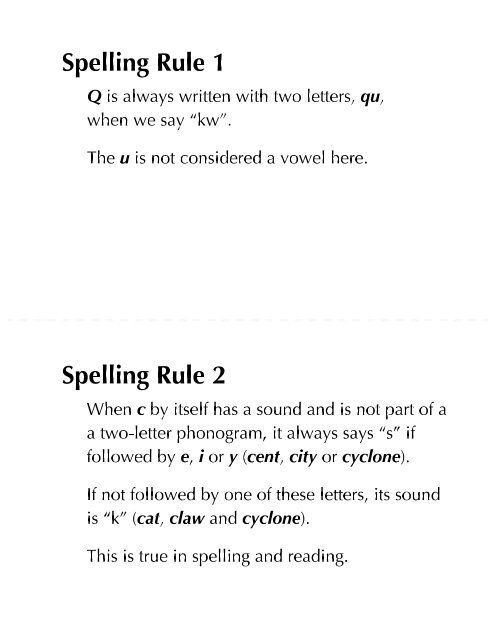Spelling Rules for Cards - Maren Schmidt
Spelling Rules for Cards - Maren Schmidt
Spelling Rules for Cards - Maren Schmidt
Create successful ePaper yourself
Turn your PDF publications into a flip-book with our unique Google optimized e-Paper software.
<strong>Spelling</strong> Rule 1<br />
Q is always written with two letters, qu, <br />
when we say “kw”.<br />
The u is not considered a vowel here. <br />
<strong>Spelling</strong> Rule 2<br />
When c by itself has a sound and is not part of a <br />
a two-letter phonogram, it always says “s” if <br />
followed by e, i or y (cent, city or cyclone). <br />
If not followed by one of these letters, its sound <br />
is “k” (cat, claw and cyclone). <br />
This is true in spelling and reading.
<strong>Spelling</strong> Rule 3<br />
<strong>Spelling</strong> Rule 4<br />
The vowels a, e, o and u usually say their names <br />
“a”, “e”, ”o” or “u” at the end of a syllable.<br />
Examples: na-vy, me, o-pen and mu-sic <br />
This is one of but three ways a vowel may <br />
say “a”, “e”, “i”, “o” or “u”.
<strong>Spelling</strong> Rule 5<br />
The letters i and y can say long “i” at the <br />
end of a syllable, but usually they say <br />
short “i”. <br />
This is shown at the end of the second <br />
syllable of both Indian and baby.<br />
<strong>Spelling</strong> Rule 6<br />
Y, not i, is used at the end of an English word. <br />
Exceptions: Taxi is short <strong>for</strong> taxicab and <br />
macaroni is an Italian word.
<strong>Spelling</strong> Rule 7<br />
There are five reasons <strong>for</strong> a silent final e. <br />
1. note: the e lets the vowel be<strong>for</strong>e it say its name; <br />
2. page/chance: the e lets the g say “j” and c say “s”;<br />
3. clue/give: English words don’t end in u or v;<br />
4. han-dle: every syllable needs a vowel;<br />
5. goose: the e keeps singular words from ending in s.<br />
And some few times there is no reason <strong>for</strong> a <br />
silent final e (are and come).<br />
<strong>Spelling</strong> Rule 8<br />
There are five phonograms that can say “er”. <br />
They are: ar, er, ir, or, and ur. <br />
Examples include early, her, third, work, <br />
and curl.
<strong>Spelling</strong> Rule 9<br />
<strong>Spelling</strong> Rule 10<br />
Sh may be used at the beginning of a word<br />
(as in shed) and at the end of a syllable (finish).<br />
But sh will not be used to begin a syllable after <br />
the first syllable, except <strong>for</strong> words ending <br />
in -ship (friendship or worship). <br />
Examples: vacation, official or discussion.
<strong>Spelling</strong> Rule 11<br />
<strong>Spelling</strong> Rule 12
<strong>Spelling</strong> Rule 13<br />
Si – but not ti or ci – can also say “zh” as in <br />
vision.<br />
<strong>Spelling</strong> Rule 14
<strong>Spelling</strong> Rule 15<br />
<strong>Spelling</strong> Rule 16
<strong>Spelling</strong> Rule 17<br />
We often double l, f and s after a single vowel <br />
at the end of a one syllable word (hill, off, <br />
glass and roll).<br />
You will also see words like recess, distaff, <br />
egg and add.<br />
<strong>Spelling</strong> Rule 18<br />
Base words do not end with the letter a saying <br />
long “a”. <br />
Ay is used most often.<br />
The exception would be the article a.
<strong>Spelling</strong> Rule 19<br />
Vowels i and o may say long “i” and long <br />
“o” if followed by two consonants (find <br />
or old).<br />
<strong>Spelling</strong> Rule 20
<strong>Spelling</strong> Rule 21<br />
All, written alone, has double l, but when<br />
written with another syllable only one l is <br />
written (al-der, al-so, al-most).<br />
<strong>Spelling</strong> Rule 22<br />
Till and full added to another syllable are <br />
written with one l (until, careful, joyful, <br />
beautiful).
<strong>Spelling</strong> Rule 23<br />
<strong>Spelling</strong> Rule 24<br />
When adding an ending to a word that ends with <br />
a consonant and y, change the y to i, unless the <br />
ending is -ing (baby, babies or try, tried, trying).<br />
In English, we almost never have an i follow <br />
another i. <br />
In the words played or boys, we do not change <br />
the y because the y is preceded by a vowel.
<strong>Spelling</strong> Rule 25<br />
<strong>Spelling</strong> Rule 26<br />
The first letter of words which are the name <br />
or title of people, places, books, days and <br />
months are capitalized.
<strong>Spelling</strong> Rule 27<br />
Z (never s) is used to say “z” at the beginning <br />
of a base word, as in zoo.<br />
<strong>Spelling</strong> Rule 28
Morrison-McCall <strong>Spelling</strong> List Evaluation<br />
<strong>Spelling</strong> Rule 29<br />
Double consonants within words of more than <br />
one syllable should both be sounded out <strong>for</strong> <br />
spelling. <br />
In writing little, we should say “lit” and write <br />
lit and then say “tle” and write tle.<br />
Other examples: little, account, effect, arrive <br />
and officer.<br />
These spelling rule cards have been adapted from The Writing <br />
Road To Reading by Romalda Bishop Spalding, and re<strong>for</strong>matted<br />
<strong>for</strong> convenient use with and by your students. Cut the sheets in <br />
half, laminate them and use them with the Morrison-McCall<br />
<strong>Spelling</strong> Lists to improve student spelling skills.<br />
The rule cards and the Morrison-McCall <br />
<strong>Spelling</strong> Lists are provided courtesy of <br />
<strong>Maren</strong><strong>Schmidt</strong>.com.<br />
Unscramble <strong>Spelling</strong> Workshop<br />
<strong>Maren</strong><strong>Schmidt</strong>.com






